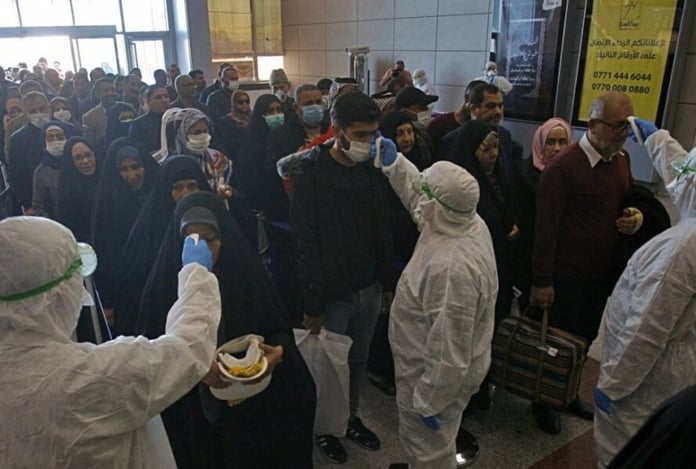In the last few days, no raids, bombings or military actions have spread panic in the Middle East. The coronavirus has managed to monopolize the attention of the population in this region too, with millions of people now fearing a sudden spread of the epidemic. The epicenter of the coronavirus in the Middle East is in Iran , where the vote for parliament on Friday was also conditioned by the emergence of contagions. Now the virus is the element that, in the coming weeks, could have the greatest impact on the political dynamics of the entire turbulent area.
Contagion in Iran
Immediately after China, Iran is the country with the most coronavirus victims. Tehran health authorities have officially recognized 6 deaths from the epidemic. But something does not go back: according to the Iranian ministry of health, coronavirus infected in the country would be “just” 28. Considering that in China, the epicenter of the virus, the mortality rate of the disease does not exceed 2%, at the moment the data Iranians would instead reveal a much higher percentage and around 21%. Therefore, it is very probable that the infected are many more than the recognized ones. Moreover, on election day from Tehran, they made it known that there are no cities in the country that are not coronavirus-free, the mayor of a district was also infected in the capital. Difficulties in detecting the virus or omissions in communication are making it difficult to understand the extent of the coronavirus phenomenon in Iran.
What is known with almost certainty, due to confirmations from local authorities, is that the infection could have started in the city of Qom . Several Chinese workers work here, some of them would have arrived from Wuhan in the days when the epidemic was beginning to spread in the city from which the virus developed. In Iran the concern is greatest, just think that at the polling stations last Friday the fever was measured for voters who went to the polls. But fear is even higher in neighboring countries. Indeed, the fear is that the Iranian health system may have serious repercussions from the coronavirus epidemic, thus also affecting the situation of neighboring nations. Which, in turn, now begin to close borders and to prohibit travel.
Measures were taken by neighboring countries
The Iranian health system compared to that of the other countries in the area seems to offer greater guarantees: the structures are widespread throughout most of the national territory, in the most important cities there are centers capable of intervening in the event of an emergency. However, the standards do not always appear sufficient and this especially in the more peripheral areas. In addition, it must be considered that Iranian health care is heavily conditioned by Western and United States sanctions, so the Tehran authorities themselves have sometimes complained about the shortage of some delicate drugs. Containing the virus is, therefore, an imperative. And this does not apply only to Iran. If repercussions on the Iranian health system can already be feared, the situation could be even more problematic in neighboring countries. Starting from Iraq: here, especially in the southern areas, basic services are sometimes lacking not only in the health sector but also in the supply of water and energy. In Baghdad, they are confident that even a small spread of the coronavirus would be unmanageable by local authorities. And therefore drastic measures have already been imposed.
No travel to Iran, ban on entering Iraq from Iran, except for Iraqis still present in the neighboring country who, however, must undergo tests at border crossings. The latter has been closed and manned for three days, the flights between the two countries have also been suspended to a later date. Last week even Ayatollah Al Sistani , the top Iraqi Shiite authority, intervened on the issue urging the Baghdad government to do everything possible to prevent the contagions. To trigger the alarm, even more, it was the first case of coronavirus detected Friday in Lebanon : in Beirut, in particular, A girl who returned from Iran tested positive. From that moment, other countries in the area, such as Lebanon itself and Kuwait and Turkey , have also decided to temporarily stop air connections with Tehran and other Iranian cities.
The political consequences
The fear is great because the awareness of the Middle Eastern countries is not strong to be able to stem an eventual emergency due to the infections. But in an already turbulent region, where the year began with the raid against the Iranian general Qassem Soleimani, the choices regarding the coronavirus cannot fail to have also possible political meanings. In Iraq, for example, demonstrations have been going on for months which, on some occasions, have targeted relations between Baghdad and Tehran. The closure of the borders between the two countries at this juncture could, therefore, represent a topic of political confrontation. In particular, from Iran, they could see in this measure a way to win the Iraqi factions most adverse to the influence of Tehran or give them the excuse to insist on the end of relations between the two countries. Similarly, in Lebanon where the new government appears closer to Iran, stopping flights could give way to those parties and formations farthest from the positions of the Islamic Republic to ask for greater distances from Iranian politics.
In a nutshell, that ” Shiite crescent” very dear to the leadership of Tehran and recommended by General Soleimani, could be reduced due to the measures taken against the coronavirus. That is, that axis that goes from Beirut to Iran, at this moment would be partially cut off because of the fear provoked by the epidemic. At the same time, those countries whose relations with the Islamic Republic appear to have deteriorated, could use this moment to try to further isolate the Ayatollahs.


